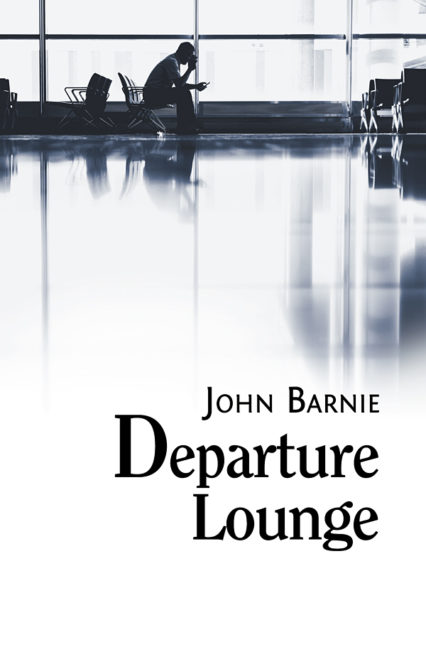Robert Minhinnick examines the latest poetry collection from a singular Welsh voice, John Barnie called Departure Lounge.
John Barnie’s flowering continues. ‘Departure Lounge’ comprises sixty-six poems in seventy-six pages. Once again his new book contains the comforting presence of copious white space. But the collection begins with a reprimand. ‘Happiness’, in fewer than fifty words, is a riposte to those who have deemed John Barnie overly serious or imbued with ‘Scandinavian gloom’. (Fair play, he is a Danish-speaker, having lectured in Copenhagen). “If you want happiness”, he implies, “you haven’t understood’’.

Opening the book I am immediately taken by Barnie’s discovery that ‘mud’ (of all things) is worth celebrating. Indeed, he decides mud is a god, and ‘A Few Words about Mud’, ‘Mud Again’ and ‘News’ constitute that god’s theology.
“Mud has no face yet manages a sneer”. About life “mud knew all along”, especially that “nowhere is central”. Mud is comfortable “in its aeons-old disguise”.
Because mud is primaeval, mud understands. There is even a Jesus Christ of mud: “twigs and stones in its mass / are mud growing fists and hair”. This son of mud once “grabbed me by the foot and pulled me down”, complains the poet. Is this satire? I would say so, welcome mischief from this poet.
Yes, Barnie might seem pessimistic (or ‘realistic’ he would say) but I find his discovery of the muddy god hilarious. For me, Barnie’s mud is up there with Borges’s ‘Ragnarok’ as religious commentary. Acerbic and necessary.
After all, mud couldn’t have spoken. Could it? Mud is mouthless yet possesses “just the viciousness that links hands with stars out in space “
Barnie is not a writer to award praise easily, but he is not a cold eye. So what does he feel our species has achieved? Science, indubitably. And art, of course. The greats figure here, as they should. Thus the references to Wordsworth, Mozart, Conrad.
But being Barnie the blues also, those lost black troubadours, men and women, who knew a thing or two. I’ve sat with the poet in his front room, walled in by his vinyl blues collection, his books on geology, his modern art. It’s an important redoubt for our culture.
Wordsworth is mentioned twice in Departure Lounge, so I turned to my favourite collection. This selection is made by Philip Wayne MA, headmaster of Marylebone Grammar School, published in 1932. The first sentence tells us “Wordsworth grew up in freedom, loved Nature passionately, suffered for liberty, and, after work of superb genius, settled down to a long, quiet life… The life of Wordsworth was girt with an altogether extraordinary power of joy…”
Unlike Wordsworth’s, Barnie’s poetry is girt with the apprehension of time, including how it makes war on his body yet sharpens his mind. But the book spans aeons – “imagine a hundred billion galaxies”. His readers, a modest band of bluesologists, poetry freaks and beachcombers, are brought together on the edge of time’s abyss and encouraged to look down. To each of us, Barnie’s poems deliver a sly nudge.
Because there’s nothing fusty about Barnie. Look at his modest front room, look at ‘Escape’:
“ I had to run out of the museum…”
Look at ‘Safari’:
“…not for me
the fading tawny vistas of the past”.
Look at tiny poems such as ‘Here We Are’ and ‘Outsourced’ which are clear political statements for today. However, there might be a danger that Barnie, so prolific does he appear, begins to write like… John Barnie. ‘Modern Times’ could be one such poem, but I am grateful for any writing in which this writer uses the word ‘selfies’. Note that this is a man famous for his dislike of photographers. Most images of John Barnie that I know reveal an unspoken “enough already” in the set of that clenched jaw as he waves the nuisance away.
Similarly, he is a dedicated non-driver. But a technophobe? Hardly. For faithful readers, the book contains the familiar: greenfinches (a Wordsworthian bird), goldfinches, wrens, as well as the surprising, ‘The Minibuses of Guyana’.
John Barnie for me is what R.S. Thomas was for earlier critics in the 1980s. I find his preoccupation with time far more attractive and yes, humane than the older poet’s god-bothering. And crucially, Barnie’s ability to coin memorable images has grown in recent years, commensurate with his ability to pare his poetry to the essence.
Yet like RS, John Barnie is something of the recusant regarding our literary culture. Serious? Hugely. Ironic? Perhaps less than a practiced reader might expect. Yet his writing is packed with bittersweet humour. (Or is that where his real ironic gift lies?).
Departure Lounge (the book’s cover is disappointingly literal,) ends with ‘How it Is’, our epitaph:
“Some say they loved each other,
But they loved the Earth too late.”
Again, we are on that abyssal edge, yet I think the poet saves the reader from falling, even with this possibly trite summation. It’s clear what irritates him about our literary world. John Barnie is aghast at the phonily hip, the poorly read who are condemned forever to rediscover the ‘Avant Garde’, celebrity laureates and the hordes of Facebook self-promoters. Certainly, I feel John Barnie should be our next ‘National Poet of Wales’. I understand his dislike and distrust of the office. But doesn’t Wales and its poetry-reading public deserve him? Barnie speaks Welsh too, which seems a qualification.
Wasn’t Wordsworth the English poet laureate? I hear from the back. Yes, but that was the artistically-exhausted Wordsworth, the poet for whom Lucy’s light had guttered out. But Barnie’s own flame remains potent. He is modern, productive and armed-to-the-teeth for the job. On the evidence of Departure Lounge, I cannot think of a better decision than giving John Barnie a crack of the national poet’s whip. Might it happen? I can hear John Barnie already groaning at the idea.
Departure Lounge is available now from Cinnamon Press.
Robert Minhinnick is a regular contributor to Wales Arts Review.












